Hair transplantation procedures, which are preferred by both men and women, are one of the methods used because they give much more successful results than hair growth products. Hair transplantation procedures are performed in hospitals, clinics and beauty centers. The permanence of the hair transplant process is directly related to the quality of the donor, the technique applied and the professionalism of the team performing the transplant operation. Almost 95% of hair transplantation procedures performed in a professional practice center achieve results that satisfy the patient and are permanent.

Contents
Hair Transplantation Techniques
There are three techniques that are commonly used in hair transplantation:
- FUT Technique: In the FUT method, hair grafts above the nape are used as the donor area. If men have a condition of complete baldness, chest hair is preferred. Approximately 1300 to 1800 grafts, that is, 4000-7000 strands of hair are transplanted into the balding area one by one.
- FUE Technique: In the FUE method, hair grafts above the neck are used as the donor area. If men have a condition of complete baldness, chest hair is preferred. The FUE method is one of the hair transplantation techniques that leaves the least seam marks and gives results in a shorter time compared to the DHI technique.
- DHI Technique: In the DHI method, hair grafts above the nape are used as the donor area. If men have a condition of complete baldness, chest hair is preferred. In the DHI technique, where up to 6000 to 7000 grafts are transplanted, a longer-lasting result and recovery process are provided compared to similar techniques using PRP therapy.
Choosing a Clinic For Hair Transplantation
The choice of the clinic, which is one of the factors affecting the permanence of the hair transplantation and the achievement of a successful result, is extremely important both in terms of professionalism and health. Hair transplantation can be done easily without endangering the skin health of patients in clinics with successful expert staff in their field and having the necessary equipment and equipment for hair transplantation applications.
The analyzes performed before the hair transplantation directly affect the way of application. Especially in men, the first goal is to use the nape region as a donor area. Because the hair that begins to recede from the forehead area is the hair that most closely resembles the hair on the back of the head, both in color and texture. If the patient has intense baldness and there is not enough hair for the donor, other body hair should be examined. It is extremely important to analyze the hair follicles, starting from the chest area, and measure their suitability for the transplantation process.
What Should Be Done to Make Hair Transplantation Permanent?
- In order for hair transplantation to be permanent, the most suitable planting technique for the patient should be selected and applied.
- Before hair transplant, all necessary analyzes should be done in full and the patient should be informed about this issue.
- Care and cleanliness of the hair after the procedure should be taken care of.
- Shampoos, conditioners and sprays recommended by the relevant doctor should be used without interruption and any hair care products other than the recommendations should not be used.
- Thin-stranded hair follicles that have just been transplanted may tend to break and fall out in the first processes. In the following periods, the hair grafts become stronger and get a fuller appearance. Washing in too hot water during this transition stage can damage the hair grafts. Washing hair in warm water is one of the steps that supports permanence.
- One or more sessions are performed to strengthen the newly transplanted hair after a certain period of time. It is necessary not to miss the sessions and follow the doctor’s instructions.

